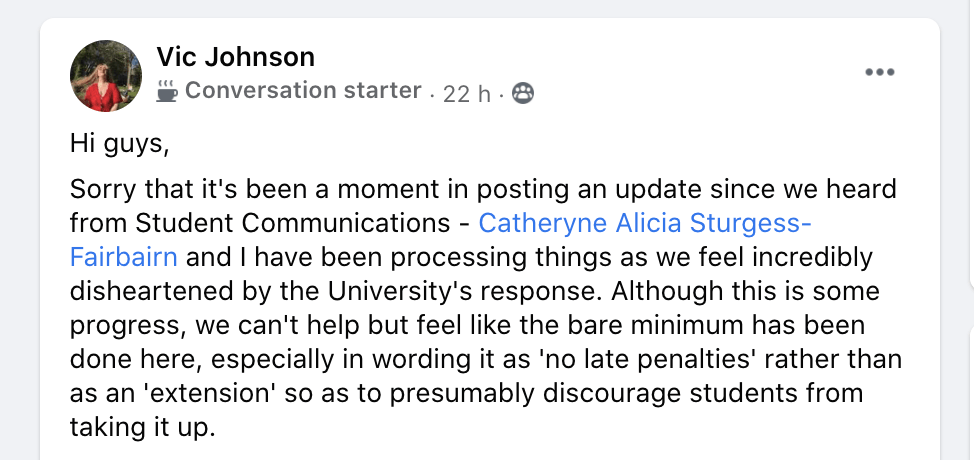After fears around COVID-19 meant that face-to-face teaching at the University of Leeds was cut short last March, the class of 2020 was offered a grade ‘safety net’. The ‘no-detriment’ policy, which was adopted by a number of universities across the country, meant that students’ final grade classification could not dip below what they had hitherto achieved. In light of the worsening circumstances this year, many of those set to graduate this summer are calling for a reintroduction of the policy via an open letter to the University. In a short break between studying and rallying for change, undergraduates Catheryne Fairbairn and Victoria Johnson spoke to the Gryphon about their experiences at university this year, what distanced learning looks like for marginalised students and why they felt compelled to create the letter.
Since the academic year began in autumn, classes have moved online for most students and access to libraries has been significantly limited. In response to these changes, the open letter calls for extensions to January deadlines and a reduction in written workload, alongside the implementation of the aforementioned ‘safety net’. To Catheryne, one of the two students behind the letter, her final year has been far from what she had expected: “It has been quite devastating, honestly”. Whilst she feels lucky to have a safe and stable home life in Newcastle, she feels the student experience has been lost through online learning. “I’m mourning the final year of making memories with friends, spending hours in the library and that final year thrill of actually having module leaders teach you rather than their postgraduate students”. The impact of this loss extends to her levels of productivity too. “The workload is impossible to manage due to the steep decline in quality of teaching, lack of access to some of the resources I need and not being able to study with my coursemates”.
The new learning conditions have had a similarly damaging effect for Victoria, who is finding completing her second year “really tough”. In particular, Victoria speaks of feelings of isolation due to living in a student house with medics on placement. Her address outside of term-time provides a similarly trying work environment due to her caring responsibilities and lack of space.
Alongside the emotional turmoil of this year’s university experience, Catheryne and Victoria suspect that their grades will also be affected. “I’m yet to see the impact on my grades but as I’m writing my essays at a noisy kitchen table I don’t hold out much hope for them,” Catheryne explains. “It’s exasperating because I know how intelligent I am and I know how much potential I have to achieve a first class degree, but I simply won’t at this rate and it’s an absolutely stomach-churning feeling.” Victoria echoes this sentiment: “The anxiety and pressure of performing to any decent standard in the middle of a global pandemic is crushing and has left many of us feeling overstretched and overwhelmed.”
Within less than 24 hours, the petition had racked up over 800 signatories, from both students and societies. Five days later, the number sits at an impressive 2205. It’s clear, then, that Catheryne and Victoria’s feelings resonate across the student body. “The vast majority of people I know are experiencing a huge sense of what can only be articulated as brain fog from anxieties relating to the pandemic”, Catheryne says. Whilst the concerns related to studying during a pandemic are widespread, both Catheryne and Victoria acknowledge that the impact is much more severe for students from working-class backgrounds, as well as those living with disabilities, chronic conditions or caring responsibilities. Furthermore, they feel as though accessing support through a ‘one size fits all’ system has been inadequate.
After gaining traction on her statement about the “classist” nature of January deadlines on Twitter, Victoria worked with Catheryne to write and circulate the open letter, despite their pressing deadlines. “It was kind of an ‘if you want something done, you’ve got to do it yourself’ scenario”, Victoria explains.
“I’ve been incredibly active in student politics since I started at university, so despite not wanting to lead on a campaign of this size at this point in the year, I felt it was necessary”, says Catheryne, who used to be part of the Student Exec team.
Several days after Catheryne and Victoria first reached out to them, and following Leeds Beckett’s introduction of a ‘safety net’ earlier this week, the University of Leeds provided an update that they will not be imposing penalties for work submitted up to one week late. This applies to all coursework with a deadline between Friday 8 January and Friday 22 January. However, the response left the letter organisers dissatisfied. Victoria wrote on Facebook’s Leeds Student Group that they were “incredibly disheartened” with what seemed like a “bare minimum” effort from the University. Victoria also condemned the choice of language in the statement, which she thinks may discourage students from pursuing the extra help.

A spokesperson of the University told the Gryphon: “We have been working in close partnership with LUU, Schools and course reps to ensure that degree classification is not negatively affected for those graduating this year, and calculations will be weighted towards the best outcomes for students. There will be further communications to students about this. We are committed to doing all that we can to ensure that students from all backgrounds should be able to achieve their full potential, and we will continue to monitor the situation around coursework and assessment throughout the second semester.”
The University added that information about the 2021 classification of degrees can be found here and here.
Featured image by Jorge Hopkins Wang.

